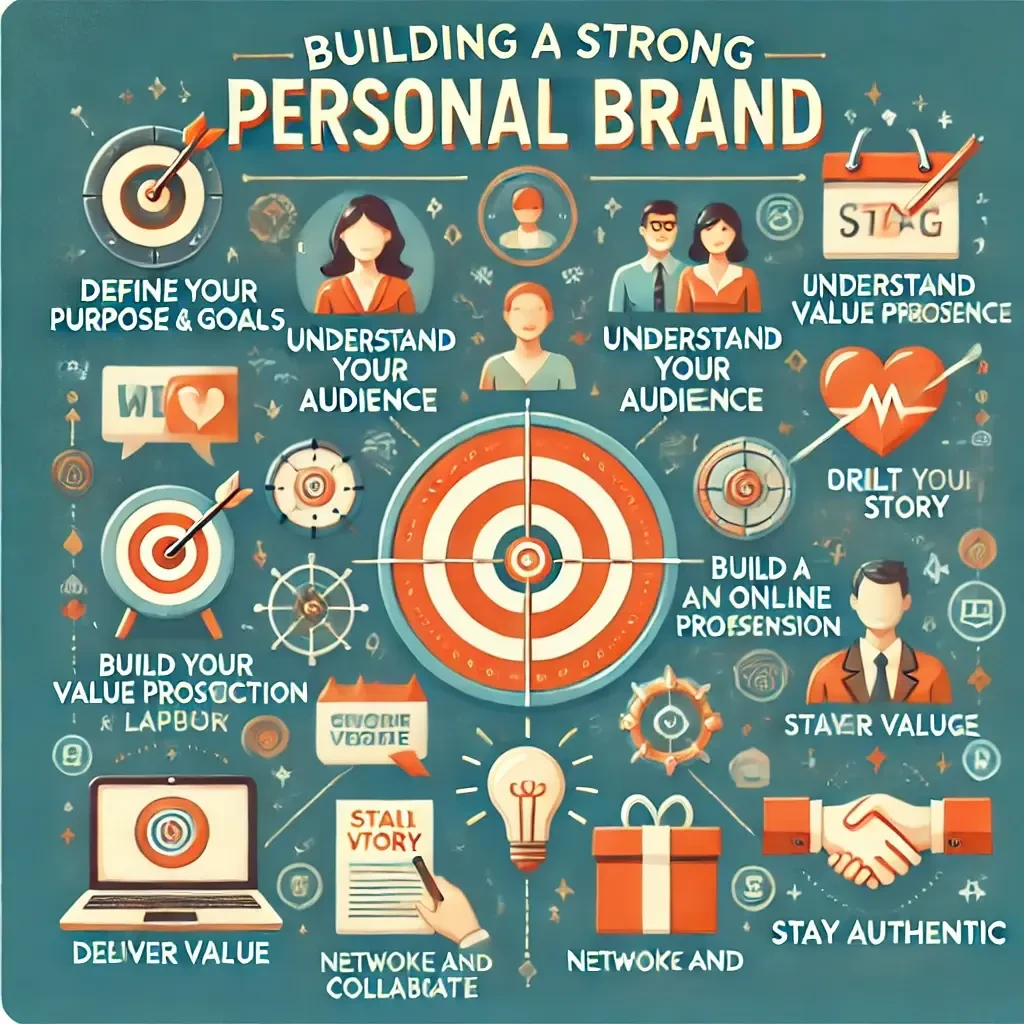Building a Strong Personal Brand
A personal brand is the unique combination of skills, experiences, and values that you represent. It’s how you present yourself to the world and differentiate yourself from others in your field. A strong personal brand can open doors to new opportunities, build trust with your audience, and enhance your professional reputation.
Here’s a step-by-step guide to building a strong personal brand:
A personal brand is the unique combination of skills, experiences, and values that you represent. It’s how you present yourself to the world and differentiate yourself from others in your field. A strong personal brand can open doors to new opportunities, build trust with your audience, and enhance your professional reputation.
Here’s a step-by-step guide to building a strong personal brand:
1. Define Your Purpose and Goals
- Why It Matters: A clear purpose gives your brand direction.
- How to Do It:
- Identify your passions and skills.
- Define what you want to achieve (e.g., career growth, influence, business success).
- Understand the problems you can solve for others.
- Why It Matters: A clear purpose gives your brand direction.
- How to Do It:
- Identify your passions and skills.
- Define what you want to achieve (e.g., career growth, influence, business success).
- Understand the problems you can solve for others.
2. Understand Your Audience
- Why It Matters: Knowing your audience helps you tailor your message and build meaningful connections.
- How to Do It:
- Determine who you want to reach (employers, clients, or industry peers).
- Understand their needs, pain points, and interests.
- Why It Matters: Knowing your audience helps you tailor your message and build meaningful connections.
- How to Do It:
- Determine who you want to reach (employers, clients, or industry peers).
- Understand their needs, pain points, and interests.
3. Identify Your Unique Value Proposition (UVP)
- Why It Matters: Your UVP differentiates you from others.
- How to Do It:
- List your strengths and achievements.
- Highlight the qualities that make you unique.
- Frame your skills and experiences as solutions for your audience.
- Why It Matters: Your UVP differentiates you from others.
- How to Do It:
- List your strengths and achievements.
- Highlight the qualities that make you unique.
- Frame your skills and experiences as solutions for your audience.
4. Build a Consistent Online Presence
- Why It Matters: Your online presence is often the first impression people get of you.
- How to Do It:
- Professional Social Profiles: Optimize platforms like LinkedIn, Instagram, or Twitter with a professional photo, bio, and keywords.
- Personal Website or Portfolio: Showcase your expertise, achievements, and services in a well-designed, easy-to-navigate site.
- Content Creation: Regularly share valuable insights through blogs, videos, or social media posts.
- Why It Matters: Your online presence is often the first impression people get of you.
- How to Do It:
- Professional Social Profiles: Optimize platforms like LinkedIn, Instagram, or Twitter with a professional photo, bio, and keywords.
- Personal Website or Portfolio: Showcase your expertise, achievements, and services in a well-designed, easy-to-navigate site.
- Content Creation: Regularly share valuable insights through blogs, videos, or social media posts.
5. Craft Your Personal Brand Story
- Why It Matters: Stories are memorable and help people connect with you emotionally.
- How to Do It:
- Share your journey, including challenges and milestones.
- Align your story with your brand values and vision.
- Keep it authentic and relatable.
- Why It Matters: Stories are memorable and help people connect with you emotionally.
- How to Do It:
- Share your journey, including challenges and milestones.
- Align your story with your brand values and vision.
- Keep it authentic and relatable.
6. Network and Build Relationships
- Why It Matters: Networking expands your reach and opportunities.
- How to Do It:
- Attend industry events, webinars, and conferences.
- Engage with your audience and peers on social media.
- Collaborate with other professionals or brands.
- Why It Matters: Networking expands your reach and opportunities.
- How to Do It:
- Attend industry events, webinars, and conferences.
- Engage with your audience and peers on social media.
- Collaborate with other professionals or brands.
7. Deliver Value Consistently
- Why It Matters: Providing value builds trust and authority.
- How to Do It:
- Share actionable advice, tips, and resources that address your audience’s needs.
- Offer free tools, guides, or webinars to showcase your expertise.
- Why It Matters: Providing value builds trust and authority.
- How to Do It:
- Share actionable advice, tips, and resources that address your audience’s needs.
- Offer free tools, guides, or webinars to showcase your expertise.
8. Maintain Authenticity
- Why It Matters: Authenticity fosters trust and credibility.
- How to Do It:
- Stay true to your values and personality.
- Avoid imitating others—let your unique qualities shine.
- Why It Matters: Authenticity fosters trust and credibility.
- How to Do It:
- Stay true to your values and personality.
- Avoid imitating others—let your unique qualities shine.
9. Invest in Personal Development
- Why It Matters: A strong brand requires continuous growth.
- How to Do It:
- Learn new skills relevant to your field.
- Stay updated on industry trends and innovations.
- Seek feedback to identify areas for improvement.
- Why It Matters: A strong brand requires continuous growth.
- How to Do It:
- Learn new skills relevant to your field.
- Stay updated on industry trends and innovations.
- Seek feedback to identify areas for improvement.
10. Monitor and Evolve Your Brand
- Why It Matters: A brand is not static—it grows with you.
- How to Do It:
- Regularly review your goals and progress.
- Adjust your messaging and strategies as your career evolves.
- Use tools like Google Alerts to monitor mentions of your name or brand online.
- Why It Matters: A brand is not static—it grows with you.
- How to Do It:
- Regularly review your goals and progress.
- Adjust your messaging and strategies as your career evolves.
- Use tools like Google Alerts to monitor mentions of your name or brand online.
Key Elements of a Strong Personal Brand
- Clarity: Your message should be clear and focused.
- Credibility: Back your claims with evidence (e.g., testimonials, case studies, certifications).
- Consistency: Maintain a uniform tone, style, and visual identity across all platforms.
- Engagement: Interact with your audience and build meaningful connections.
- Reputation: Act with integrity to build a positive reputation.
- Clarity: Your message should be clear and focused.
- Credibility: Back your claims with evidence (e.g., testimonials, case studies, certifications).
- Consistency: Maintain a uniform tone, style, and visual identity across all platforms.
- Engagement: Interact with your audience and build meaningful connections.
- Reputation: Act with integrity to build a positive reputation.
Benefits of a Strong Personal Brand
- Increased visibility and recognition in your industry.
- Better career or business opportunities.
- Enhanced trust and credibility with your audience.
- Greater influence and the ability to lead.
- Increased visibility and recognition in your industry.
- Better career or business opportunities.
- Enhanced trust and credibility with your audience.
- Greater influence and the ability to lead.
Conclusion
Building a strong personal brand takes time and effort, but it is a powerful tool for personal and professional success. By staying authentic, delivering value, and maintaining consistency, you can create a brand that resonates with your audience and sets you apart from the competition.
Building a strong personal brand takes time and effort, but it is a powerful tool for personal and professional success. By staying authentic, delivering value, and maintaining consistency, you can create a brand that resonates with your audience and sets you apart from the competition.





